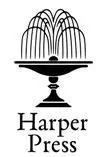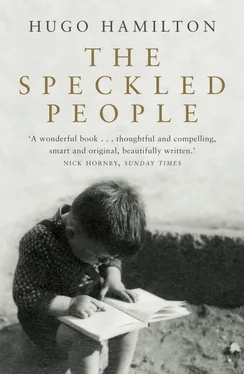The Speckled People
Hugo Hamilton

The author would like to thank Colm Tóibín and Eileen Ahearn for their generous help and encouragement with The Speckled People. Many thanks also to Colum McCann, Joseph O’Connor, Seán Ó Riain, Hans Christian Oeser, Gerald Dawe, Leo Lecours and John Smallwood. The author also wishes to acknowledge the financial assistance of Aosdána and The Arts Council in Dublin, as well as the financial support and hospitality of DAAD in Berlin and Künstlerhaus Schloss Wiepersdorf in Brandenburg.
Harper Press
An imprint of HarperCollins Publishers Ltd 1 London Bridge Street London SE1 9GF
www.harpercollins.co.uk
This edition published by Harper Perennial 2012
Paperback edition first published in 2004
First published in Great Britain in 2003 by
Fourth Estate
Copyright © Hugo Hamilton 2003
The right of Hugo Hamilton to be identified as the author of this work has been asserted by him in accordance with the Copyright, Designs and Patents Act 1988
A catalogue record for this book is available from the British Library
All rights reserved under International and Pan-American Copyright Conventions. By payment of the required fees, you have been granted the non-exclusive, non-transferable right to access and read the text of this e-book on screen. No part of this text may be reproduced, transmitted, downloaded, decompiled, reverse engineered, or stored in or introduced into any information storage and retrieval system, in any form or by any means, whether electronic or mechanical, now known or hereinafter invented, without the express written permission of HarperCollins e-books.
HarperCollinsPublishers has made every reasonable effort to ensure that any picture content and written content in this ebook has been included or removed in accordance with the contractual and technological constrains in operation at the time of publication.
Source ISBN: 9780007148110
Ebook Edition © FEBRUARY 2013 ISBN: 9780007380237
Version: 2019-09-25
This ebook contains the following accessibility features which, if supported by your device, can be accessed via your ereader/accessibility settings:
Change of font size and line height
Change of background and font colours
Change of font
Change justification
Text to speech
‘I wait for the command to show my tongue. I know he’s going to cut it off, and I get more and more scared each time.’
Elias Canetti
Cover Page
Title Page
Copyright
Note to Readers
Epigraph
One
Two
Three
Four
Five
Six
Seven
Eight
Nine
Ten
Eleven
Twelve
Thirteen
Fourteen
Fifteen
Sixteen
Seventeen
Eighteen
Nineteen
Twenty
Twenty-one
Twenty-two
Twenty-three
Twenty-four
Twenty-five
Twenty-six
Twenty-seven
Twenty-eight
Twenty-nine
Thirty
About the Author
Praise
Also by the Author
About the Publisher
When you’re small you know nothing.
When I was small I woke up in Germany. I heard the bells and rubbed my eyes and saw the wind pushing the curtains like a big belly. Then I got up and looked out the window and saw Ireland. And after breakfast we all went out the door to Ireland and walked down to Mass. And after Mass we walked down to the big green park in front of the sea because I wanted to show my mother and father how I could stand on the ball for a count of three, until the ball squirted away from under my feet. I chased after it, but I could see nothing with the sun in my eyes and I fell over a man lying on the grass with his mouth open. He sat up suddenly and said, ‘What the Jayses?’ He told me to look where I was going in future. So I got up quickly and ran back to my mother and father. I told them that the man said ‘Jayses’, but they were both turned away, laughing at the sea. My father was laughing and blinking through his glasses and my mother had her hand over her mouth, laughing and laughing at the sea, until the tears came into her eyes and I thought, maybe she’s not laughing at all but crying.
How do you know what that means when her shoulders are shaking and her eyes are red and she can’t talk? How do you know if she’s happy or sad? And how do you know if your father is happy or whether he’s still angry at all the things that are not finished yet in Ireland. You know the sky is blue and the sea is blue and they meet somewhere, far away at the horizon. You can see the white sailing boats stuck on the water and the people walking along with ice-cream cones. You can hear a dog barking at the waves. You can see him standing in the water, barking and trying to bite the foam. You can see how long it takes for the sound of the barking to come across, as if it’s coming from somewhere else and doesn’t belong to the dog at all any more, as if he’s barking and barking so much that he’s hoarse and lost his voice.
When you’re small you know nothing. You don’t know where you are, or who you are, or what questions to ask.
Then one day my mother and father did a funny thing. First of all, my mother sent a letter home to Germany and asked one of her sisters to send over new trousers for my brother and me. She wanted us to wear something German – lederhosen. When the parcel arrived, we couldn’t wait to put them on and run outside, all the way down the lane at the back of the houses. My mother couldn’t believe her eyes. She stood back and clapped her hands together and said we were real boys now. No matter how much we climbed on walls or trees, she said, these German leather trousers were indestructible, and so they were. Then my father wanted us to wear something Irish too. He went straight out and bought hand-knit Aran sweaters. Big, white, rope patterned, woollen sweaters from the west of Ireland that were also indestructible. So my brother and I ran out wearing lederhosen and Aran sweaters, smelling of rough wool and new leather, Irish on top and German below. We were indestructible. We could slide down granite rocks. We could fall on nails and sit on glass. Nothing could sting us now and we ran down the lane faster than ever before, brushing past nettles as high as our shoulders.
When you’re small you’re like a piece of white paper with nothing written on it. My father writes down his name in Irish and my mother writes down her name in German and there’s a blank space left over for all the people outside who speak English. We’re special because we speak Irish and German and we like the smell of these new clothes. My mother says it’s like being at home again and my father says your language is your home and your country is your language and your language is your flag.
But you don’t want to be special. Out there in Ireland you want to be the same as everyone else, not an Irish speaker, not a German or a Kraut or a Nazi. On the way down to the shops, they call us the Nazi brothers. They say we’re guilty and I go home and tell my mother I did nothing. But she shakes her head and says I can’t say that. I can’t deny anything and I can’t fight back and I can’t say I’m innocent. She says it’s not important to win. Instead, she teaches us to surrender, to walk straight by and ignore them.
We’re lucky to be alive, she says. We’re living in the luckiest place in the world with no war and nothing to be afraid of, with the sea close by and the smell of salt in the air.
Читать дальше













